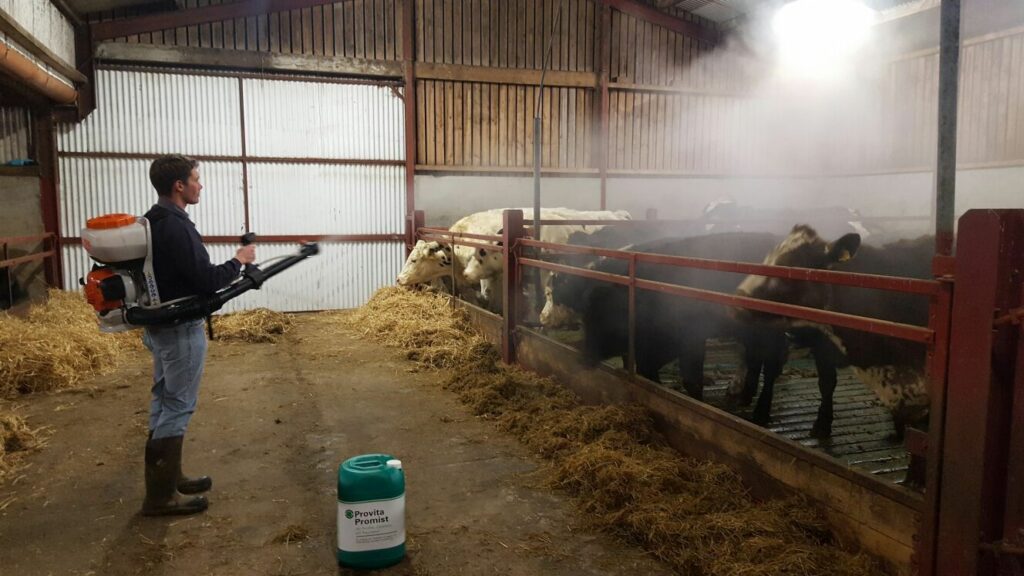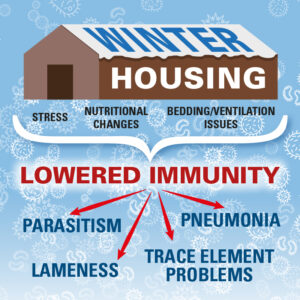How to deal with winter housing problems
22nd October 2021
Winter indoor housing is a high-risk period for cattle and can be one of the most stressful times of the entire year. Dr Tom Barragry, veterinary surgeon, pharmacologist and adviser to Provita Animal Health, offers advice on avoiding common and costly health concerns at housing.
Animals indoors can be put under stress very easily, causing elevation in blood cortisone levels, which can trigger suppression of the immune system. Stressful changes in temperature, environment, housing and feeding can result in a depression of the immune system which coincides with an increase in the rapid spread of diseases, especially as the cattle will be in a confined space.
Lameness, pneumonia, lice, fluke, and worms are common problems associated with winter housing, not simply because of time of year but also because of ventilation, housing, environmental infection pressure, immunity, and other issues. Nutrition may be compromised in some units and fodder, especially silage, may vary in quality, and hence trace element deficiencies are not uncommon.
Lameness
It is well established that lameness is a very costly disease. It can predispose not only to ill thrift, and trace element problems, but it is also a ‘gateway disease’, leading to serious infertility and mastitis issues. Indoor problems such as high stocking rates (causing slurry to build up), poor bedding, cubicle design, or slurry pooling in open yards, can cause foul in the foot or digital dermatitis. Slurry will harbour considerable amounts of microorganisms which will increase the likelihood of infection.
Underfoot conditions such as slats, concrete floors, bedding, excessive moisture, slipping, and slurry can precipitate significant outbreaks of lameness. Floors and underfoot surfaces in pens/cubicles must provide adequate grip to reduce injuries from slipping. Rough or uneven surfaces lead to excess wear on hooves, with sole bruising and infection becoming evident. Foot lesions, when they occur, tend to be more severe in housed animals than in grazing animals.
Unfortunately, treatment rather than prevention seems to be the focus of many lameness management programmes, but such an approach can be a serious waste of money. Prevention, by using regular footbaths, is the only way forward. If lameness can be put under control before housing, the subsequent financial benefits will be clearly seen throughout the winter period. For effective results, regular foot bathing is essential.
Using a safe, effective, proven and ‘green’ product like Provita Hoofsure Endurance is the proper preventive approach for lameness and significantly reduces incidence of clinical lesions and thus the spread of foot infection across the herd. UK field reports have indicated that foot bathing with Hoofsure Endurance after every milking has reduced lameness problems by 50%.
The Hoofsure range also includes Konquest gel to be applied to larger lesions. It has advanced bio-adhesion properties which help the gel stick to the skin and hoof. Combat spray is a unique non-antibiotic spray providing persistent longer-lasting activity. Combat should be used for spot spraying in parlour or during hoof trimming.
Air quality at housing
Winter is a high-risk time for pneumonia infection – the most common cause of death in all cattle above one month old. It inevitably results in poorly performing calves. There are several steps farmers can take to prevent pneumonia, including not only vaccination but also optimisation of ventilation and air quality.
A continual flow of fresh air throughout a shed is important, and research has shown that animals perform better in clean air. In well ventilated sheds with clean air, animals are much less likely to develop respiratory infections, because there is less droplet infection and pathogen inhalation.
Provita Promist is a unique air purifier containing a blend of natural organic acids, essential oils and wetting agents which together help control the levels of particulate matter, dust and reduce ammonia in the housing of intensively reared livestock. It can be used when new calves/cattle are introduced into houses, or during still weather conditions with stagnant air flow circulation, or until air flow improves in the shed.
Promist can also be used daily in houses that have permanently poor air flow. It should be used above and around the cattle and will purify the air, the surfaces and the animals. Its herb content will provide an expectorant effect helping to expel organisms from the respiratory tract.
According to field reports, using Promist daily in the cattle/calf shed for the first month or so after housing, has resulted in beneficial results. “We didn’t have one case of pneumonia to deal with last year and the calves responded in spades regarding the growth rates they achieved,” reported one user. Pneumonia cannot be defeated unless air quality, air circulation and air cleanliness are heightened and maximised.
John McClelland from Dungiven, Northern Ireland uses many Provita products on his suckler cow and sheep farm, including Promist to clean and purify the air in his sheds on foggy and clammy days. He has been farming for many years and says he has noticed a great difference since using Promist.


